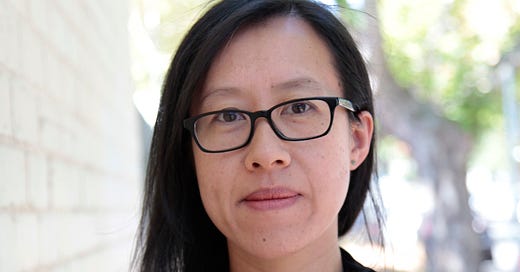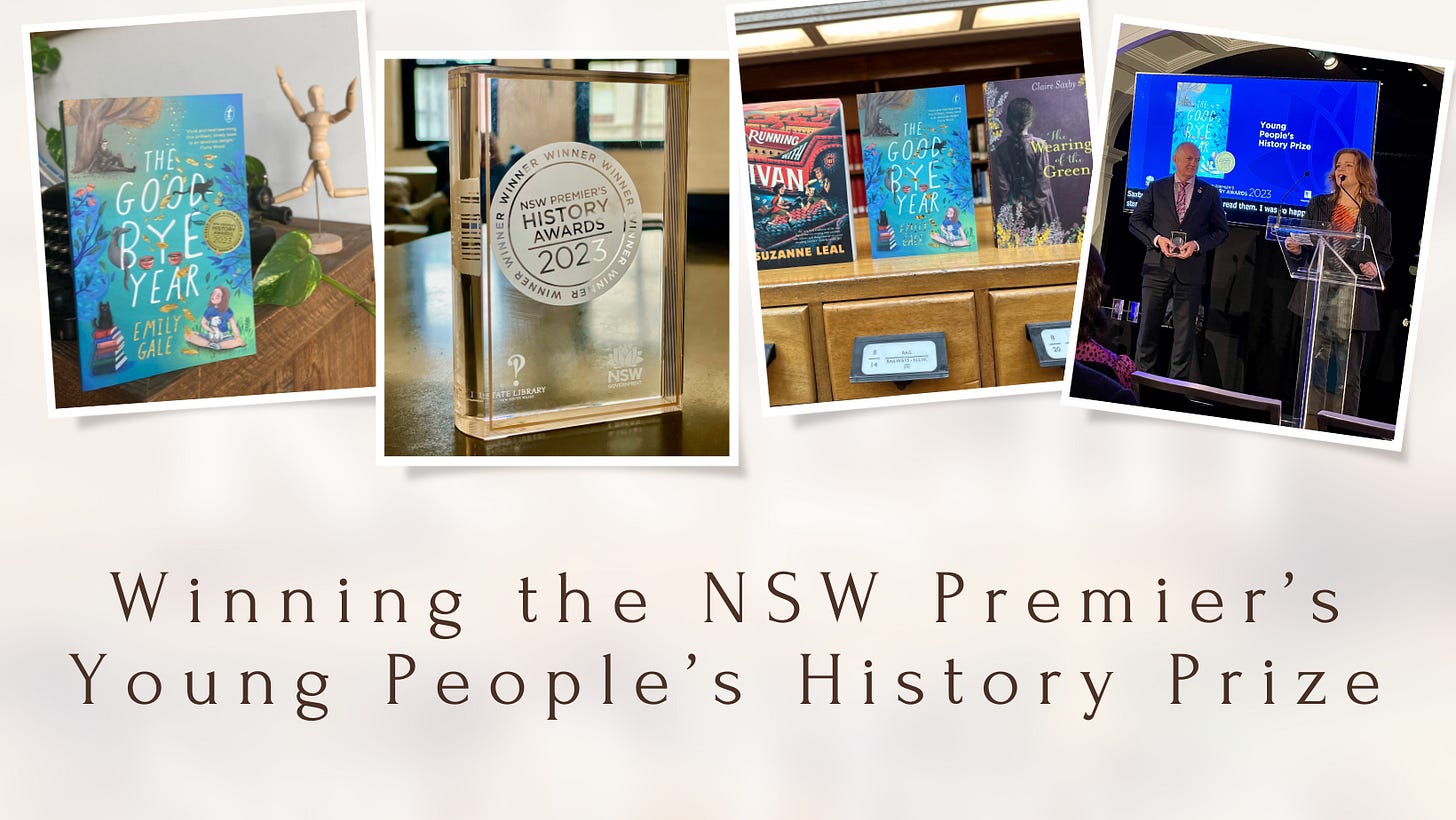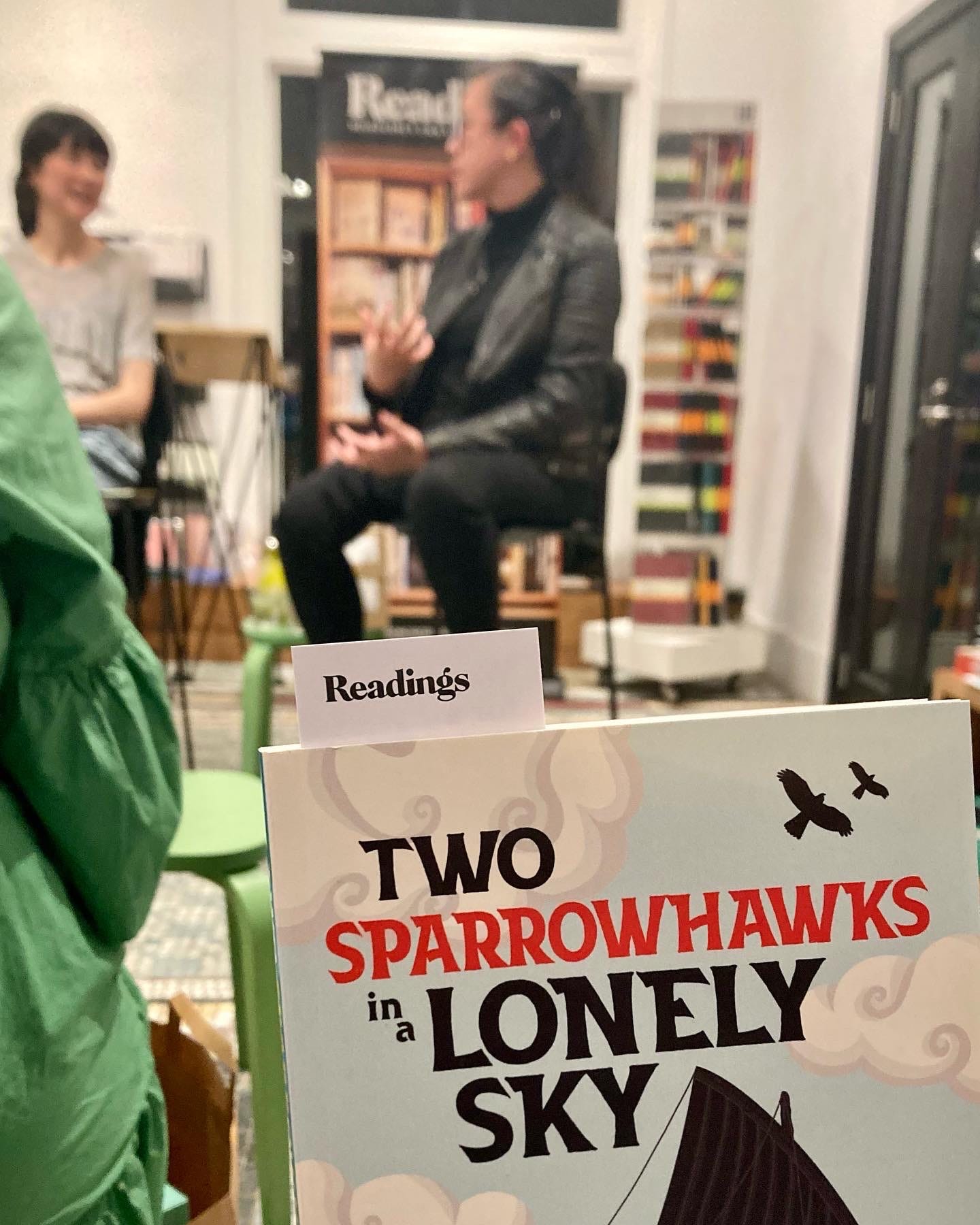Dear Reader,
This month, I won an award. I didn’t cope with that very well. When I was notified I’d won, I had to sign a confidentiality agreement and swear to keep schtum until the weighty glass object was in my hands, so my partner took the full force of my anxiety. In my defence, I’m out of practice: I haven’t won a thing since I was 11 (that was a prize for history, too).
What was my anxiety about? Shyness, I think, and being notoriously bad at processing good news. Almost immediately I panicked about making a speech, tripping on the stairs, dropping the award, forgetting to thank people, forgetting to put trousers on; I really spiralled. The day before the ceremony, I walked 23,000 steps around the shops, channelling my worry into what to wear.
I ended up in secondhand black trousers, a top I’ve had for twenty years, an oversized pinstriped jacket that makes me look like a banker, and green boots that my daughter said reminded her of Peter Pan. Oh well.
But I let myself feel the joy once the speech was over and I’d navigated three steps on wobbly pins to take a seat next to my partner in the audience at the State Library. I was grateful and stunned that the panel of historians had chosen The Goodbye Year, which is set in 2020. And, sorry to be crass, I was also bloody relieved to have my writing income doubled in what has been a challenging year. (Judges’ comments.)
Text offered unwavering support for this book since its muddled first draft, especially my editor, Jane Pearson, and that’s really something for a story with blurry edges and a dose of Covid19. It’s now been featured on education, speculative fiction, history, and mystery award lists. Having put so much of myself into this book, a year on I can let it go. That’ll do, book, that’ll do.
Enough about me. Let’s talk about Rebecca Lim.
This month saw the release of Two Sparrowhawks In A Lonely Sky, and I went to the Melbourne launch. Speaking of awards, author Leanne Hall (The Gaps) was a brilliant launcher — Leanne won so many awards for The Gaps that they had to shrink the award stickers to fit them all on the front cover. Rebecca Lim’s Tiger Daughter is much the same, with now five starred reviews since its US release.
Two Sparrowhawks in a Lonely Sky is about siblings who are forced to flee China in the 1950s, hoping to find their father in Australia after a decade apart. It covers the years leading up to the Great Leap Forward and centres on the tragedy and necessity of leaving, as well as the methods and risk, as does the wonderful Freedom Swimmer by Wai Chim, which takes place a few years later. Both authors used their family history to tell these important stories.
Rebecca Lim presents a faithful account of escape — but I note that she refers to the depiction of the rural community in China as “gentle”, designed for the 11+ reader. The children grow up first in poverty and then on the brink of starvation. Inevitably, then, the main characters are at the mercy of adults in this finely wrought narrative. The intervention of a female cadre, a boat woman, and a Polish Jewish refugee, are highlights.
In Lim’s stylish prose, the story sings and crackles where it should, and is precise and tight for the fiddly parts of 1950s emigration bureaucracy. Danger comes in different forms; some of the dangers to these brave children are actual forms. Like No Words by Maryam Master, about an Iranian refugee (likewise Own Voices), Two Sparrowhawks addresses a profound need for the stories of non-white immigrants.
This month for paid subscribers:
I reflected on a question that stumped me during Book Week in Minis #2, Writer’s Block in Disguise
And then the time seemed right to tell the truth in Why I (Really) Started This Newsletter (and what I’ve learnt in nine months)
For free subscribers:
My mum went to boarding school and throughout my childhood I got her potted version of it, romanticised by the promise that I’d never have to go, and by how delightfully mischievous my mum was. (Still is.) Having loved Jessica Miller’s The Republic of Birds and The Hotel Witch, and discovering when I interviewed her that she went to boarding school, too, I asked Jessica to write about why these ‘home away from home’ settings remain a draw for young readers. It’s a great piece.
Bewitched by Boarding School Fiction, by Jessica Miller
And I was happy to see how many more downloads there have been of my interview with Jessica, Letters Home.
The Voice
Here’s a stat for you, courtesy of the mysterious data behind this newsletter: 86% of my readers are in Australia. Then follows the US, the UK, and lots of other countries with a handful of readers each.
On 14th October, Australians will vote on whether to change the Constitution to recognise the First Peoples of Australia by establishing a body called the Aboriginal and Torres Strait Islander Voice. Similar to Norway and New Zealand and other parts of the world.
There has been, despite the diligent background work and untiring effort of the Yes campaign, a nefarious effort to corrupt the purpose of this constitutional change. The truth has been discarded; lies are reported to be winning. But there’s still time.
This month I listened to The Voice to Parliament Handbook, by Thomas Mayo and Kerry O’Brien: 2 and a half hours of truth-telling, political history, and hope. Chapter 10 answers every question or doubt I’ve heard from the No side.

Writing
I’m plate-spinning: out on submission, checking typeset pages, researching, and first drafting. Four separate books and no one to blame but myself.
Reading
Exasperated by the way I spiralled after winning an award, I read Shy by Sian Prior, and what she says about being shy but not being a classic introvert was perfect. For fellow shy-bears who keep finding themselves in public speaking situations:
“ . . . I enjoyed the adrenaline rush that came from pleasing the crowd . . . It was the self-consciousness I couldn’t stand, the way my own mind habitually stood outside itself, watching me, evaluating me. The constant performance anxiety.”
I tried to read the short novel In Watermelon Sugar by Richard Brautigan, but couldn’t get that Harry Styles song out of my head. It seems like a novel to read when you’re stoned, and I wasn’t.
So I read Nothing Special by Nicole Flattery. Beginning with a character in middle-age, and focussing heavily on her mother being at the end of her life, the rest of the story is about her being 17: extracting herself from school, family, and friendships that no longer fit; wanting to be discovered by and desired by men, but finding them pathetic or predatory; watching everyone but close to no one; finding the world of employment bizarre and lacking. It really does capture a side of being 17, and also made me think of Cassandra at the Wedding with its sharp observations, underlying damage, and the sometimes startling clarity. But for me it had a funny shape, and nearly lost me in the middle. I’m keen to read Flattery’s short stories.
Meanwhile, I’ve been slow-listening to Meryl Streep reading Tom Lake by Ann Patchett. Flawless.
Favourite industry news:
Although it was depressing to learn, via Creative Australia’s survey results, that engagement in reading in Australia has reduced slightly since 2019 (but over two-thirds of Australians read for pleasure and 1 in 7 produce creative writing), I felt lifted by attending an all-day reading symposium called Volume, provided by Australia Reads. To catch up on their research into reading, check out their Research Review.
One thing I liked was the idea of looking to other industries for inspiration about engagement. When I try to explain how the publishing industry works to someone outside it, they look at me as if I’m mad. And though we love it, some aspects of this industry are mad, and out of date (and many are perfect, and if anyone touches them I’ll hunt them down) — so it seems wise overall to open ourselves up to possibilities beyond our tight walls.
Here’s a wrap-up of the event.
Irritation of the month:
AI. Except not AI, but the thieving humans making AI. From the Australian Society of Authors:
After months of concern and speculation, it was horrifying to have confirmed yesterday that many Australian authors’ books are included in a dataset of books used to train artificial intelligence without permission from the authors. It confirms what we have suspected: that books from pirate sites have been used to train AI.
There is now a lawsuit in the US against Open AI, the maker of ChatGPT. The Authors Guild filed the class-action on behalf of 17 plaintiffs, including Jodi Picoult, George R.R. Martin, and Jonathan Franzen.
In the words of Celeste Ng, which I nabbed from Twitter today:
“What makes art special is its humanness, its individuality, and AI won’t ever replace that. But it IS going to make profits by stealing. And both writers and the world generally
will be poorer for it, literally and figuratively.”
To finish, a photograph I took this month in the part of the world I’m lucky enough to write on: the unceded Wurundjeri Lands of the Kulin Nation.
You see why I can’t stop writing novels that are set by the river.
Goodbye September; here’s to October. X
Thank you for reading Voracious. You’re welcome to comment on or share this post. You’ll find my other free posts by visiting emilygale.substack.com and clicking the Nutshells heading. All other posts are divided into categories to help you to navigate: Writers on Writing, Children’s Books, Industry Talk, and Writers on Reading. Subscriptions are $5 per month or $50 per year, with discounts for groups. Founding members receive a zoom call or email exchange to discuss any aspect of your writing. Public posts are available for 4 weeks from publication. The full archives can be accessed by paid subscribers.







